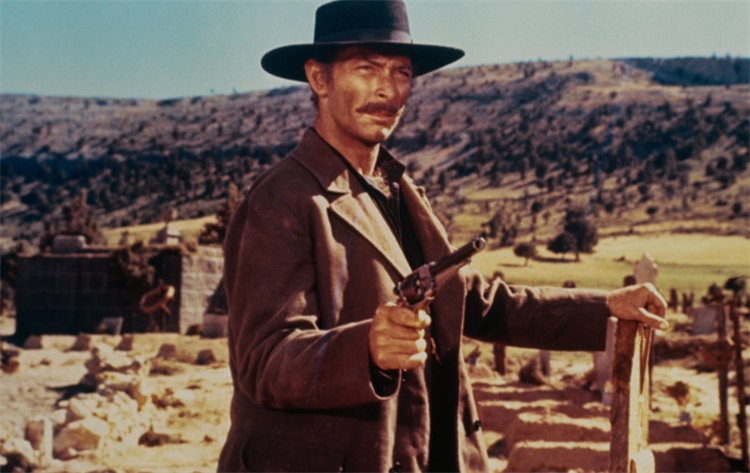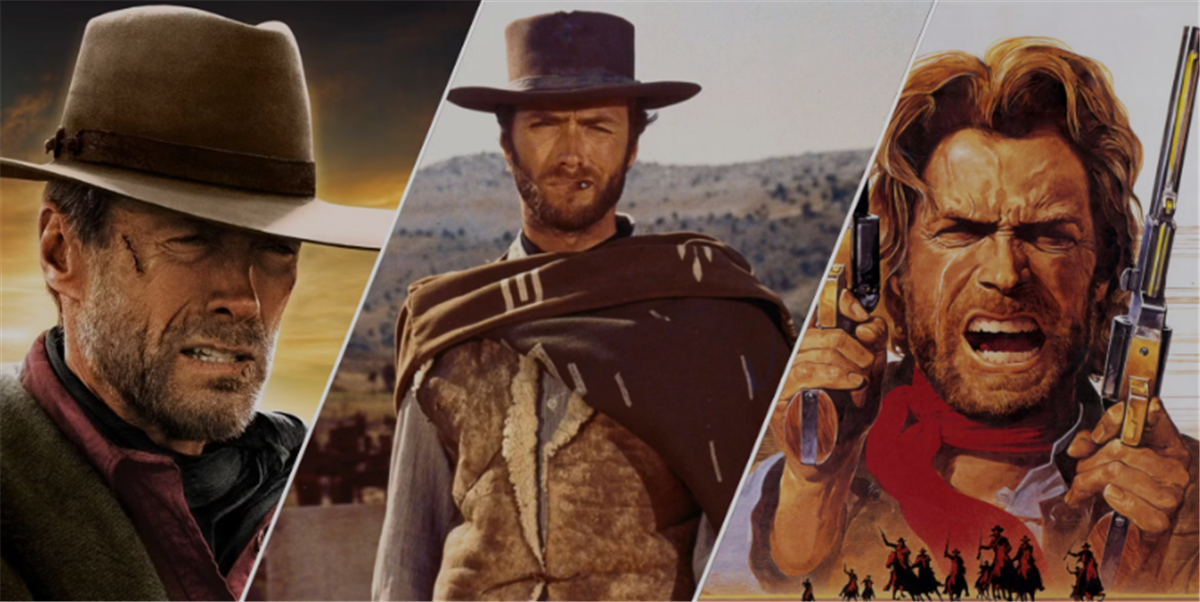An underappreciated star stole scenes from both Western legends.
He’s decent. In fact, good. If the rarity of him receiving leading roles leads you to believe otherwise, reconsider. Lee Van Cleef is a genuine cinema star despite being unfairly but sensibly typecast as ruthless, cunning villains. In High Noon, he intimidates with minimal to no conversation. He steals The Good, The Bad, and The Ugly out from under Clint Eastwood together with an unbeatable Eli Wallach. Van Cleef shines as the leading guy in travestiously underappreciated spaghetti westerns like Death Rides a Horse and Day of Anger.
While it’s true that Eastwood, Wayne, and Golden Age superstars like Jimmy Stewart and Henry Fonda live more comfortably in the stratosphere of being household names, Van Cleef absolutely deserves to be mentioned among the ranks of the most crucial actors in Western film history.
Lee Van Cleef Is the Perfect Western Villain

Without a formidable foe, there can be no great hero, right? In terms of portraying a villain in the Western genre, Lee Van Cleef is essentially the best (and most reliable) actor in the business. He serves as an intense opposing force to his “good-guy” co-stars in each of his captivating performances, which elevates every film he appears in. After a silent but unforgettable appearance in the Oscar-winning Western High Noon, Van Cleef rapidly became typecast for his portrayal as the titular Bad (or Angel Eyes) in The Good, The Bad, and The Ugly. Lingering in the background, smoking cigarettes, playing a harmonica, and always looking on with his steely eyes, Lee Van Cleef is arguably the most memorable of the desperados that arrive unwelcome in Gary Cooper’s town. He doesn’t need any of that pesky dialogue. He just stands in the background looking tough, and it works.
It’s more of the same in the John Wayne-starring The Man Who Shot Liberty Valance. Van Cleef sticks to the background, his lines of dialogue few and far in between, meanmugging every goddamn person in the frame. It’s a shame that his character is punched out by Wayne’s and rendered useless for the rest of the movie — he made a convincing scoundrel that should have made it to the climax. Of course, most notable are Van Cleef’s roles in Sergio Leone’s Dollars trilogy. Showing up in the second and final films, the actor plays against a top-form Eastwood as antagonist characters.
He portrays a rival bounty hunter to Eastwood’s Man With No Name in For A Few Dollars More. Mortimer (Van Cleef) is a more interesting character than the primary protagonist, despite the fact that he finally (and somewhat grudgingly) teams up with the Man in order to accomplish a mutual purpose. Although all of Clint Eastwood’s gnashing of teeth and cigar-sucking has its merits (he is a legend, after all), there are very few instances in which we are interested in his thoughts. He seeks out ransoms. He carries a gun and shoots people. What else is there to say?
Van Cleef, though, wanders across the movie dressed in an imposing all-black outfit, looking like a manifestation of Death itself. Mortimer is shrouded in mystery, with an enigmatic past that helped the character become interesting. Eastwood’s Yojimbo-turned-gunman is fun to watch, but it’s really only when playing off of Van Cleef that he truly impresses. The two behave like long-lost twins (they both shoot a helluva lot of people and are good at it) but are played entirely differently. Van Cleef breathes more personality into his role. He brings to his character complexity that makes him somebody to both fear and empathize with. He wins this round.
Again, it’s for The Good, The Bad, and The Ugly that Van Cleef will be most remembered, and for good reason. As the movie’s sadistic, cold-blooded villain, Angel Eyes mows down a man after interrupting his breakfast, slays another in his bed, and backstabs anybody that he needs to in order to get what he wants. Just look at his first appearance in the film, in which he appears on the horizon, approaches the camera, and unsaddles from his horse while Ennio Morricone’s magnificent score booms over the soundtrack. He scans the landscape with his intense gaze, and that’s all we need to see this is one nasty bugger. When he shows up during the film’s monumental climactic standoff — the best in the entire genre — he brings with him the sort of unstoppable chaotic force that makes him a perfect antagonist. In a film with three indelible performances, Van Cleef arguably walks off with the award.
Van Cleef responded positively to being typecast as the bad guy when asked by Johnny Carson if he ever gets bored of portraying the bad guy. They truly have pretty nice characters. Some of them have a lot of depth, the actor remarked. Van Cleef is the heavy to cast when you want a ferocious, imposing character to equal your character, at least in the Western genre, so that helps. Just so damn skilled at it. often in a distracting way.
Lee Van Cleef’s Few Starring Roles Are Equally Convincing

Beyond his numerous antagonistic supporting roles, Lee Van Cleef is equally impressive in his few starring roles that were cut short by his death at 64. Death Rides a Horse, arguably Van Cleef’s most convincing turn as protagonist, transforms his signature villainy into a stoic moral ambiguity of close relation to that of Clint Eastwood’s Man With No Name. He kills hordes of criminals while helping a young man (John Phillip Law) seek retribution for the murder of his family. Van Cleef’s character is fast to draw and fire upon anyone who presses him, but unlike most Eastwood heroes, he doesn’t point a gun at innocent bystanders. Even if there may be some unpleasant memories from his past, he reserves his shots for both murderers and attackers, and he is working towards atonement.
The movie is an underrated Spaghetti Western, one of the best from the genre’s golden era and every bit as good as Sergio Corbucci’s more widely recognized Django. Van Cleef is as infectious as Franco Nero’s titular character, too. Van Cleef saddles up to a rival-slash-sensei type of role that combines badassery and wizened charisma. John Phillip Law, in the role of the core protagonist, is repeatedly overshadowed by his elder’s looming authority.
Van Cleef makes up for weak villains in this dual-headed revenge film by playing both the “hero” and the fool in this movie. He rides harder, shoots quicker, and acts more intelligently than Law. His fatherly appreciation for Law’s qualities helps to repair his ethically defective nature. An old man who has been scarred by his traumatic past begins to reflect on the time he lost while being unfairly imprisoned. Van Cleef portrays it flawlessly, enraged at those who deceived him but not without a sympathetic place concealed beneath his tyrannical, sun-cracked exterior.
Day of Anger plays again with a similar formula by placing Van Cleef again in the role of tutor, only this time his character is more damnable. He’s a bit power-crazed and vengeful, quickly crossing the line into moral reprehensibility. Throughout the picture, he upstages his co-star Giuliano Gemma, who plays the movie’s hero. Part of it is due to Van Cleef’s utter believability as a tough-and-lousy man with mere ounces of kindness buried somewhere in his heart, but part of it also comes from the magnitude of the actor’s presence. 1969’s eccentric western Sabata has Van Cleef as a preposterously skilled gunman with a custom-made four-barrel Derringer pistol. He’s more straight-laced here, showcasing even further his ability to be heroic in defiance of his typical villain typecasting. It’s pretty standard genre fare, but Van Cleef’s intensity helps patch the film’s flaws.
Van Cleef’s gritty appearance is exploited in The Big Gun, which presents him as a fierce bounty hunter on the prowl for an evil rapist. In the final installment of the Magnificent Seven series, The Magnificent Seven Ride!, an aging Van Cleef assumes the legendary character of Chris Adams from Yul Brynner (who, ironically, also played Van Cleef’s Sabata in its sequel). Van Cleef shines in the part, giving it the experience of an industry veteran and the knowledge of an old wise man.
In all these movies, Lee Van Cleef proves time and time again why he, in addition to being an invaluable supporting actor, has the qualities of a leading man. Good or evil, moral or immoral, Van Cleef’s characters are captivating. The actor’s signature scowl gives the man an impenetrable severity while he meanwhile drops his lines with a threatening nonchalance (“maybe a rat like you is better off dead”). When placed along his co-stars with whom he shares top billing, Van Cleef out-acts everyone around him, stealing the scene and eating it hungrily. Law and Gemma, two actors playing his proteges, are lost amidst the action. They are comparatively forgettable, forever in their elder’s shadow. As for Leone’s Dollar films, the movies ultimately belong to Eastwood, but that’s just because he’s playing the hero. At nearly every opportunity, Lee Van Cleef steals the scene from his co-star, making the movies just as much his as anybody’s.
